Career Japanese Course
1This course will provide you with the skills you need to communicate effectively in today's business world, including presentation, speaking and writing skills, and will enable you to find a job, start a business and develop your career in Japan.
- Home
- Course Introduction
- Career Japanese Course
A Specialized Career Support "Career Japanese" Program
One of the most important qualities that Japanese companies are looking for in their foreign employees is the ability to communicate clearly and appropriately in Japanese. The Japanese Language Career Course is designed for those who wish to improve their professional Japanese language skills with the aim of contributing to their organization and society in Japan.
-
Features of the Career Japanese Course
-
The three skills that companies expect from you
-
Three reasons to get results
-
An innovative 'mentoring and facilitation' system, under the responsibility of professional teachers
-
A "tailor-made" career support plan
-
Changing social structures in Japan: An opportunity for " highly qualified foreigners "!
-
FAQ
Features of the Career Japanese Course
An ideal "career education environment" that has been achieved through the pursuit of educational quality

More than 300 international students from abroad find employment in Japan each year at ISI Group, which is highly regarded by many graduates and employers for our human resource development and generous job-hunting support. ISI Group provides a fulfilling career education environment for those who wish to find employment, incorporating the know-how of Japanese language education and job hunting support that ISI Group has accumulated over the years.
We are waiting for you with high-quality business Japanese language education, support by experienced career advisors, and an “ideal environment” featuring ISI Group’s abundant corporate information and the latest facilities and equipment, with the aim of “success in the workplace” and “settling in Japan” beyond the job offer.
Specializing in employment and career support in Japan

This course specializes in providing career support for those who wish to find employment or start a business in Japan, and who wish to improve their business Japanese language skills and business skills at the same time to advance their careers.
One of the most important qualities that Japanese companies are looking for in their foreign employees is the ability to communicate clearly and appropriately in Japanese. The Japanese Language Career Course is designed for those who wish to improve their professional Japanese language skills with the aim of contributing to their organization and society in Japan.
This course will provide you with the presentation, speaking and writing skills you need to obtain job offers and communicate effectively in the business environment required by corporate employers. Through a variety of activities and interactive exercises, these courses wwill provide students with the knowledge needed to operate appropriately in both formal and informal professional situations, as well as how to write effective emails and express ideas. Ultimately, these courses will help you go from finding a job in Japan to being successful in the workplace.
Practical Business Japanese Education

From the Beginner level onwards, you will learn “Japanese for Business” and all your daily Japanese learning will be directly linked to your career development. In the first half of the intermediate level, you will learn the expressions in the Japanese textbook using a method developed by us to be used in business situations. In the latter half of the Intermediate level to the Advanced level, students will learn to be aware of the hierarchical relationship in a company organization, as well as internal and external relationships, and will be able to enhance the social skills that Japanese companies are looking for in foreigners, such as “understanding the situation and feelings of others, and being able to collaborate with other companies and carry out one’s role independently”.
Please take a look at the Career Japanese Course classes.
Business Japanese
Intermediate Class
Pre-Intermediate Class at ISI
The three skills that companies expect from you
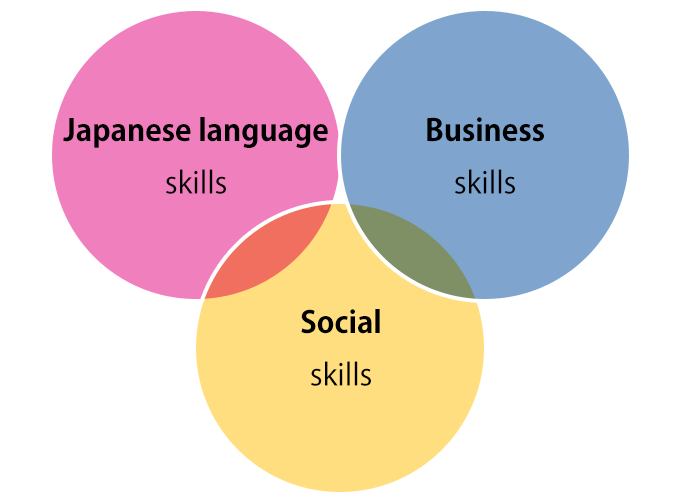
●Japanese language skills
A person with the necessary knowledge and ability to use Japanese to demonstrate their expertise and experience.
The course offers a balanced study of the four skills of the Japanese language and prepares students for the Japanese Language Proficiency Test (JLPT), which is necessary for employment.
●Business skills
A person who understands and can manage Japanese job hunting and corporate culture.
Students learn business Japanese skills necessary for various business situations such as answering the phone, writing emails, meetings, negotiations, presentations, etc. You will also receive thorough guidance on how to obtain a job offer.
●Social skills
A person who can take the initiative in carrying out their role in collaboration with others, taking into account the situation and feelings of others.
Through group work and “task activity for collaborative learning”, students will gain an understanding of different cultures, develop independence, ambition and communication skills.
Three reasons to get results

Personal advisor system for your peace of mind
All students are assigned a dedicated career advisor who will accompany them on their journey to employment. The “sense of security” that comes from being able to consult with us at any time when you need help will lead to better results.

The One-stop Service for liability
Our strength is that we do not rely 100% on external agencies, but provide a one-stop job hunting service.

A "tailor-made" career support
Shortly after enrollment, we will assist you in making a job hunting plan based on your Japanese language skills required for your desired job and graduation schedule. Here you will find a personalized, “just for you” support plan.
An innovative 'mentoring and facilitation' system, under the responsibility of professional teachers
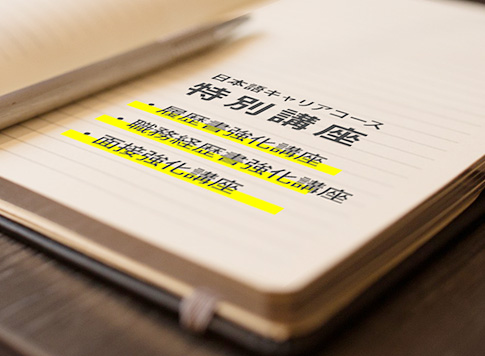
A wide range of out-of-classroom career support programs.
Recruitment seminars and interviews for foreign talents are held from time to time both inside and outside the school. Every semester, a specialist lecturer will give you a course to strengthen your CV, resume and mock interviews, which you can attend as many times as you like, free of charge, to help you overcome your weaknesses. The one-stop support system makes it possible to offer a comprehensive career support programes that can only be found here.

Exceptional career guidance time
Compared to other general long-term courses (according to our research), the course offers more than 90 hours of career guidance per year, including career orientation, individual interviews, job hunting lectures, document review, interview guidance and special job hunting classes.
A "tailor-made" career support plan

Step 1: Identify the actions required
・Confirmation of target job (sector, job type)
・Confirmation of required Japanese language skills
・Confirmation of graduation ( employment ) date
・Identify the items (actions) required to achieve this goal.
Step 2: Creating a career roadmap
・Create a timetable working backwards from your graduation date
・Providing career guidance tailored to your individual needs
・Tracking your progress with a career advisor
・Fostering goal management skills while learning
Career roadmap (reference case)
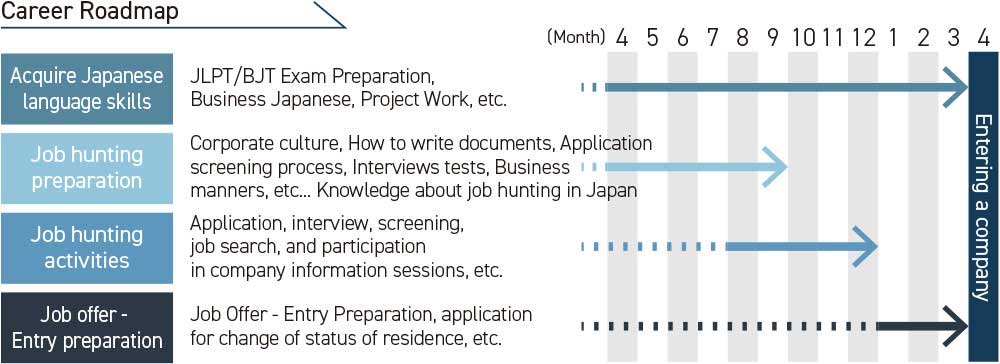
Breakdown of companies and industries with job offers
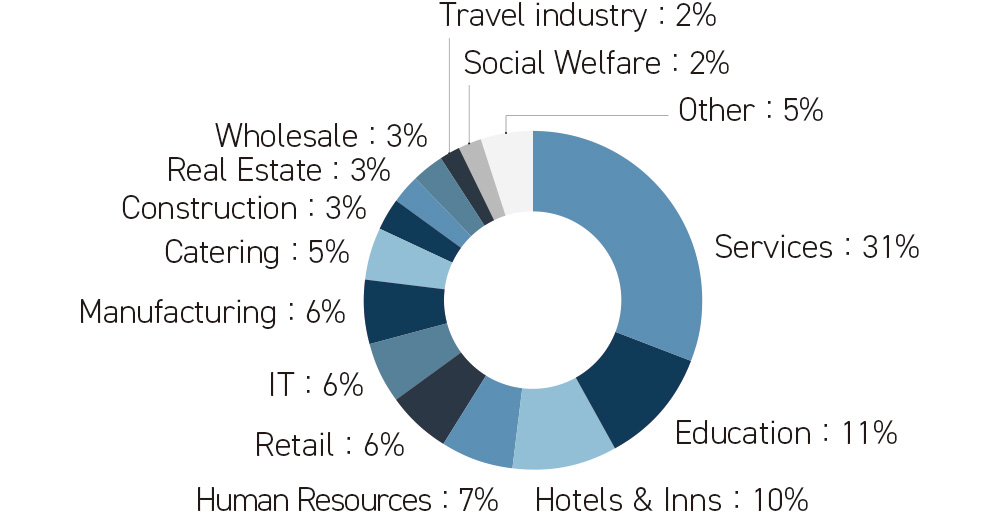
*Information on employment of ISI Group students in fiscal 2024 (by industry).
Changing social structures in Japan: An opportunity for " highly qualified foreigners "!
Number of foreign workers by status of residence
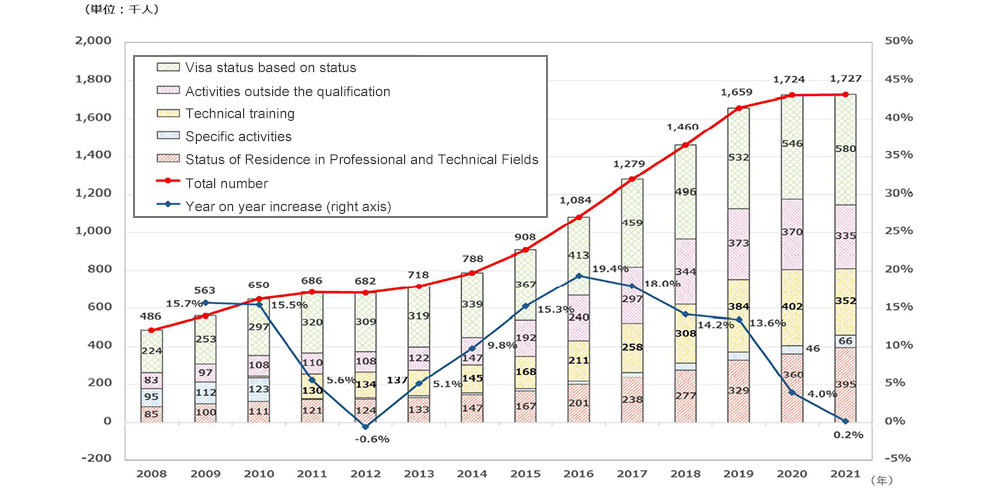
Note 1: “Status of residence in a specialized or technical field” means a status of residence that allows the holder to stay in Japan for the purpose of employment, such as manager, engineer, researcher, foreign cuisine chef, or special skills.
Note 2: “Status of residence based on status” is based on the status or position held in Japan, and includes permanent residents and Japanese nationals.
Note 3: “Specified activities” are those activities which the Minister of Justice specifically designates for individual foreign nationals.
Note 4: “Activities other than those permitted under the status of residence previously granted” refers to work activities other than the activities that are the original purpose of residence (up to 28 hours per week in principle), and includes part-time jobs for international students.
700 companies have placed employees (for the past 3 years)
Rakuten, Inc., Amazon Japan G.K., Indeed, Pokémon, Inc., Dentsu, EY Strategy and Consulting K.K., NTT DATA Aurora Corporation, Yonex Corporation, Canon Electronics Technology Inc. Shangri-La Hotels Japan K.K., Anderson Mori & Tomotsune, Prada Japan K.K., Yamaha Music Japan K.K., Five Fox, Tokyu Department Store, RingRow, APA Hotel, Sidax Corporation, General Kikkoman Foundation, Schneider Electric Software K.K., IDOM Corporation, Transcosmos inc. Tokyo, TBS Planning Corporation, Okuda Architects & Engineers, Inc., Norwegian Embassy, Berlitz Japan K.K., Japan Householding Corporation, Asia Information System Corporation, Japan Technos Corporation, Japan Airport Logitem Corporation, Daiwa Resort Co. Hotel K.K., Prince Hotel K.K., etc.
Career Japanese Course Implementing Schools
FAQ
-
What makes it different from other Japanese language schools?
-
ISI provides one-stop job placement support. While many other Japanese language schools outsource job placement support to outside companies, ISI provides job placement support by the school’s teachers. The support of teachers who know you well and the peace of mind of being able to ask questions at any time will lead you to better results.
In addition, since ISI employees handle everything from class content review to communication with companies that offer job placement opportunities, ISI is able to accumulate know-how within the school and provide even better job placement support. -
Can I really find a job in Japan?
-
There are many “mechanisms” that make employment possible.
- At an early stage, the school will know your major and the type of work you would like to do, and will start to gather information about the jobs and companies you would like to work for.
- Shortly after enrollment, you will work with your teacher to plan your employment schedule. We will set the required level of Japanese and when you will reach it, so that you can study Japanese and find a job systematically.
- Employment support specialists are involved in the creation of the curriculum. The curriculum is designed to help students develop their business skills while learning Japanese and apply them to their job search activities.
- While many Japanese schools only offer one or two sessions of CV and interview coaching, a two-year course will give you at least four to six in-class sessions and at least three out-of-class sessions to work on your CV and interview. We also offer free individual coaching to students who wish to do so, giving them an unparalleled opportunity to practice their skills.
-
Can I get a job with N3?
-
Although it is possible to find a job, ISI recommends that you acquire a higher level of Japanese language proficiency before finding a job. If your Japanese language skills are low, there are only a limited number of positions available, and it will not be easy to develop your career afterwards.
Since our goal is not to “obtain a job offer” but rather to be active afterwards, our first priority is to help students acquire higher Japanese language skills. -
What is the job hunting schedule?
-
For new graduates, the screening process usually starts in March, one year before graduation. Ideally, you should have achieved N2 on the JLPT in December of the previous year or July of the following year.
-
Am I a new graduate? or Mid-career?
-
The company decides. In general, if you have no previous work experience, you will be treated as a “new graduate” for up to three years after graduation.
-
I'm in the middle of my career, can I still find a job?
-
It will be more difficult than for new graduates, so plan well and be proactive. Mid-career means that you are hiring people who have experience in the job (experienced people). The difficulty is to find the right job at the right time and with the right Japanese language proficiency. In general, mid-career jobs come up because there is a shortage of people and they are often urgent offers, so once a company finds the right person, the job is closed. Therefore, while you are wondering whether you will get the job or not, the job will be gone.



